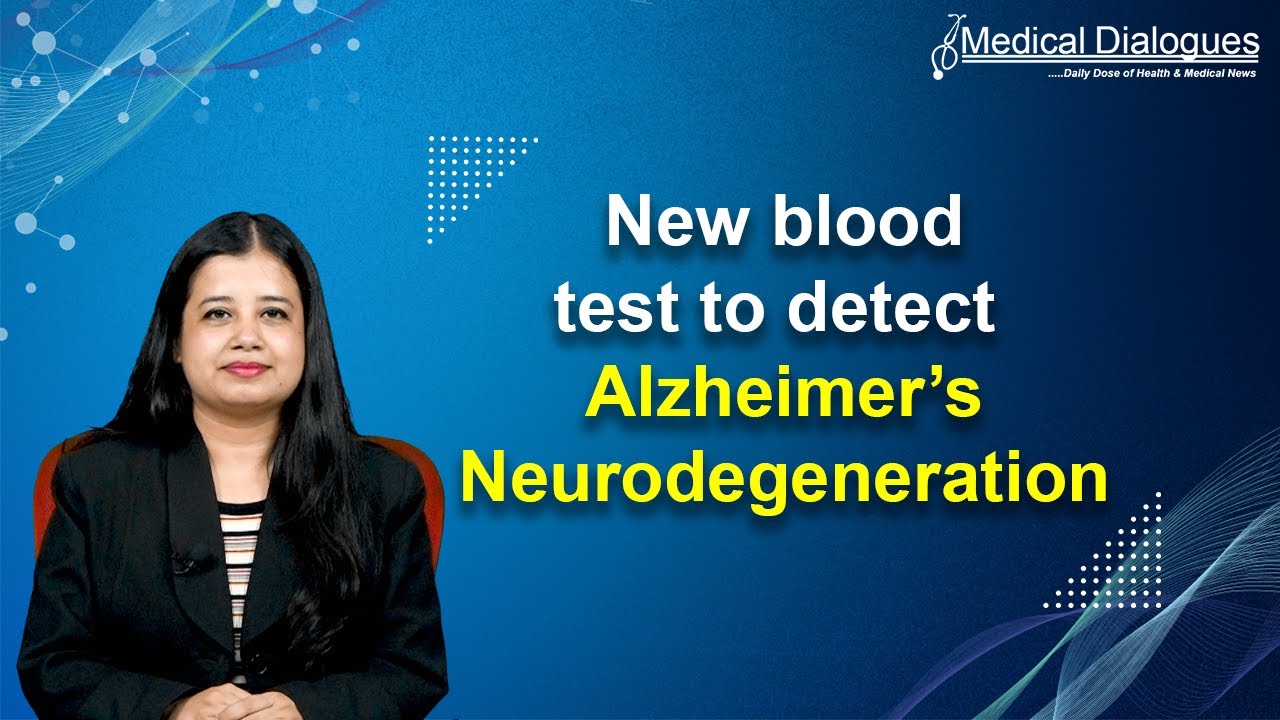Researchers Develop A Reliable Blood Test To Diagnose Alzheimer's Disease
Researchers have developed a blood test to diagnose Alzheimer's disease that may replace invasive medical exams. It is possible now that the blood test will allow for quicker detection of the condition as well.
Author:Karan EmeryReviewer:Daniel JamesDec 30, 2022103.1K Shares1.4M Views

Researchers have developed ablood test to diagnose Alzheimer's diseasethat may replace invasive medical exams. It is possible now that the blood test will allow for quicker detection of the condition as well.
It might be difficult to see the signs of Alzheimer's disease early on. A lumbar puncture and brain scan are now used to diagnose Alzheimer's disease.
Cerebrospinal fluid (CSF) from the spinal cord is extracted during a lumbar puncture and analyzed. Painful procedures are used to collect CSF, and some patients report post-procedure headaches and/or back discomfort.
What Is Dementia?
Dementia is an umbrella term for a group of neurodegenerative conditions that share symptoms including memory loss and behavioral changes, as well as cognitive decline.
Alzheimer's disease is the most prevalent kind of dementia, although there are many others. Multiple dementias may coexist in a single individual.
Most cases of mixed dementia have a combination of Alzheimer's disease-related aberrant protein deposits and vascular dementia-related issues with the brain's blood vessels.
In 2020, it was predicted that 7 million Americans will have dementia. By 2040, the number of people living with dementia in the United States might reach over 12 million, up from an estimated 9 million in 2030.
Alzheimer's disease dementia accounts for around six million of these diagnoses. The likelihood of a person having dementia rises in tandem with their chronological age. Although diagnostic rates are on the rise, it is estimated that many persons with dementia are still going unrecognized.
Alzheimer's Diagnosis
A combination of brain imaging and cell analysis is often used by clinicians when they need to confirm a diagnosis of Alzheimer's. Both approaches have certain drawbacks.
The latter is performed using a lumbar puncture, sometimes known as a spinal tap, which is an intrusive and unpleasant treatment. A cerebrospinal fluid sample will be taken by inserting a needle into the lower back.
The next step is for a lab technician to look for abnormally high levels of amyloid and tau proteins in the sample, as well as indicators of increasing nerve cell death. Although MRI scans are noninvasive, they might be difficult to get because of their high cost and limited availability.
A blood test is the next best thing for identifying Alzheimer's disease. Even while some of these methods can identify aberrant tau protein levels, they are not as good at identifying the symptoms of neurodegeneration. This may soon change, however.
The results of a novel antibody-based blood test developed by a team of scientists from the United States, Sweden, Italy, and the United Kingdom were published this week in the journal Brain.
Unique to Alzheimer's disease, brain-derived tau proteins may now be detected using the new test. After analyzing data from 600 individuals, the scientists discovered its test accurately differentiated between Alzheimer's and other neurodegenerative disorders.
University of Pittsburgh psychiatry professor and co-author Dr. Thomas Karikari told The Guardianthat he hoped the innovation will aid in the design of better clinical trials for Alzheimer's therapies.
“„A blood test is cheaper, safer and easier to administer, and it can improve clinical confidence in diagnosing Alzheimer’s and selecting participants for clinical trial and disease monitoring.- Dr. Thomas Karikari, University of Pittsburgh
More research is needed before the test may be offered at hospitals in your area. A first step is to confirm its efficacy over a broad range of patients, including those of various races.
Antibody-Based Blood Test
While aberrant levels of amyloid and tau proteins may be detected by existing blood testing, it has proven more difficult to identify indicators of nerve cell damage that are unique to the brain. Karikari and his international colleagues set out to create a blood test that uses antibodies to identify brain-derived tau, a type of tau protein that is unique to Alzheimer's disease.
Protein levels were measured in CSF from 600 individuals with varying stages of Alzheimer's disease; researchers observed a strong correlation between CSF and brain tau levels and concluded that the test could consistently identify Alzheimer's from other neurodegenerative disorders.
Alzheimer's disease protein levels correlated with the prevalence of amyloid plaques and tau tangles in brain tissue from those who had passed away with the disease. Brain released the study's findings.
The next step is to verify the test's accuracy in a larger sample of patients, including those of diverse racial and ethnic groups and those with varying degrees of memory loss and other possible dementia symptoms.
Karikari also thinks that measuring blood levels of tau generated from the brain will help with the development of clinical trials for Alzheimer's therapy.
“„There is a huge need for diversity in clinical research, not just by skin color but also by socioeconomic background. To develop better drugs, trials need to enroll people from varied backgrounds and not just those who live close to academic medical centers. A blood test is cheaper, safer and easier to administer, and it can improve clinical confidence in diagnosing Alzheimer’s and selecting participants for clinical trial and disease monitoring.- Dr. Thomas Karikari, University of Pittsburgh

Blood test can detect Alzheimer’s neurodegeneration biomarker in blood: Pitt Study
Final Words
Blood-tau levels discovered in Alzheimer's disease patients using the novel assay correlated with Cerebrospinal fluid levels of tau and successfully differentiated Alzheimer's from other neurodegenerative illnesses, as shown by the tests.
Brain autopsy investigations indicated that the presence of amyloid plaques and tau tangles in the tissue of the brain was proportional to the levels of blood-tau.
Researchers believe that by keeping an eye on blood-tau levels, they will be able to better organize clinical trials and recruit patients from underrepresented groups.

Karan Emery
Author
Karan Emery, an accomplished researcher and leader in health sciences, biotechnology, and pharmaceuticals, brings over two decades of experience to the table. Holding a Ph.D. in Pharmaceutical Sciences from Stanford University, Karan's credentials underscore her authority in the field.
With a track record of groundbreaking research and numerous peer-reviewed publications in prestigious journals, Karan's expertise is widely recognized in the scientific community.
Her writing style is characterized by its clarity and meticulous attention to detail, making complex scientific concepts accessible to a broad audience. Apart from her professional endeavors, Karan enjoys cooking, learning about different cultures and languages, watching documentaries, and visiting historical landmarks.
Committed to advancing knowledge and improving health outcomes, Karan Emery continues to make significant contributions to the fields of health, biotechnology, and pharmaceuticals.

Daniel James
Reviewer
Daniel James is a distinguished gerontologist, author, and professional coach known for his expertise in health and aging.
With degrees from Georgia Tech and UCLA, including a diploma in gerontology from the University of Boston, Daniel brings over 15 years of experience to his work.
His credentials also include a Professional Coaching Certification, enhancing his credibility in personal development and well-being.
In his free time, Daniel is an avid runner and tennis player, passionate about fitness, wellness, and staying active.
His commitment to improving lives through health education and coaching reflects his passion and dedication in both professional and personal endeavors.
Latest Articles
Popular Articles